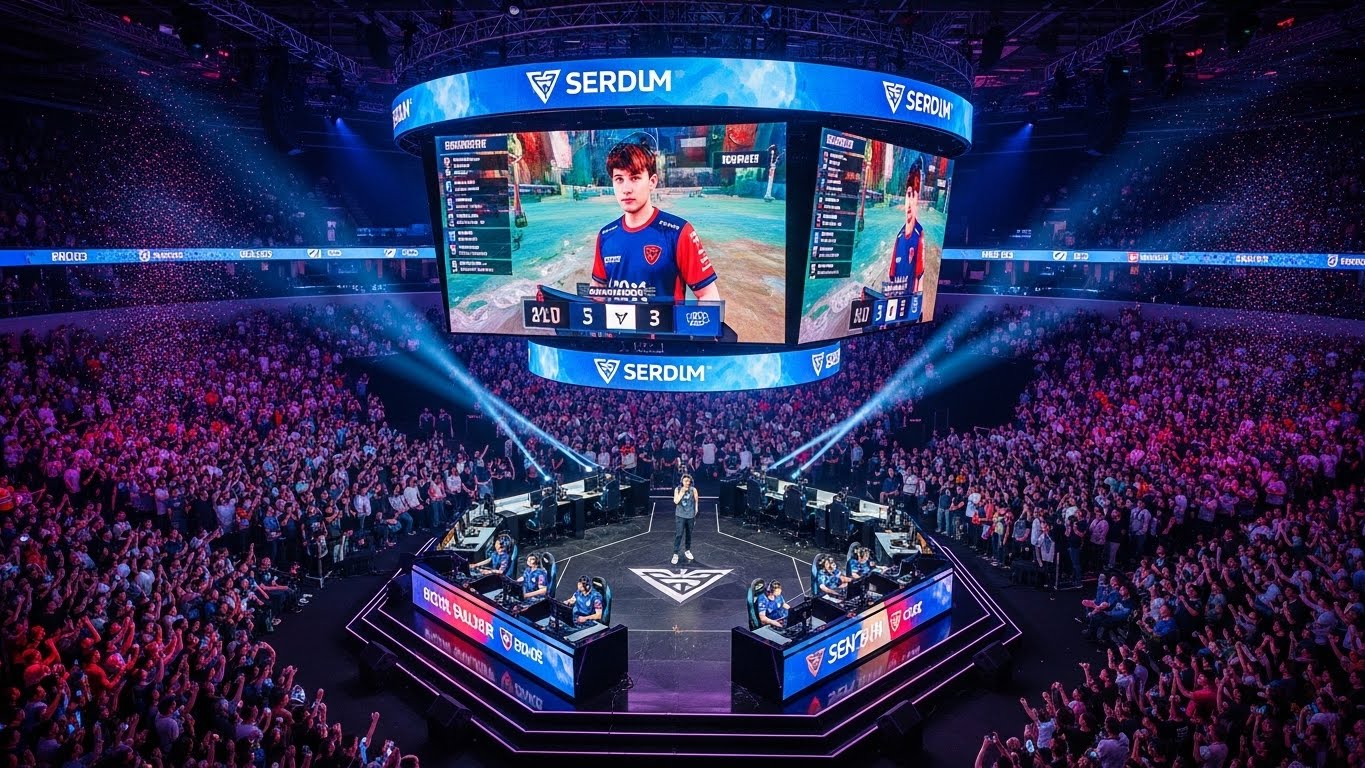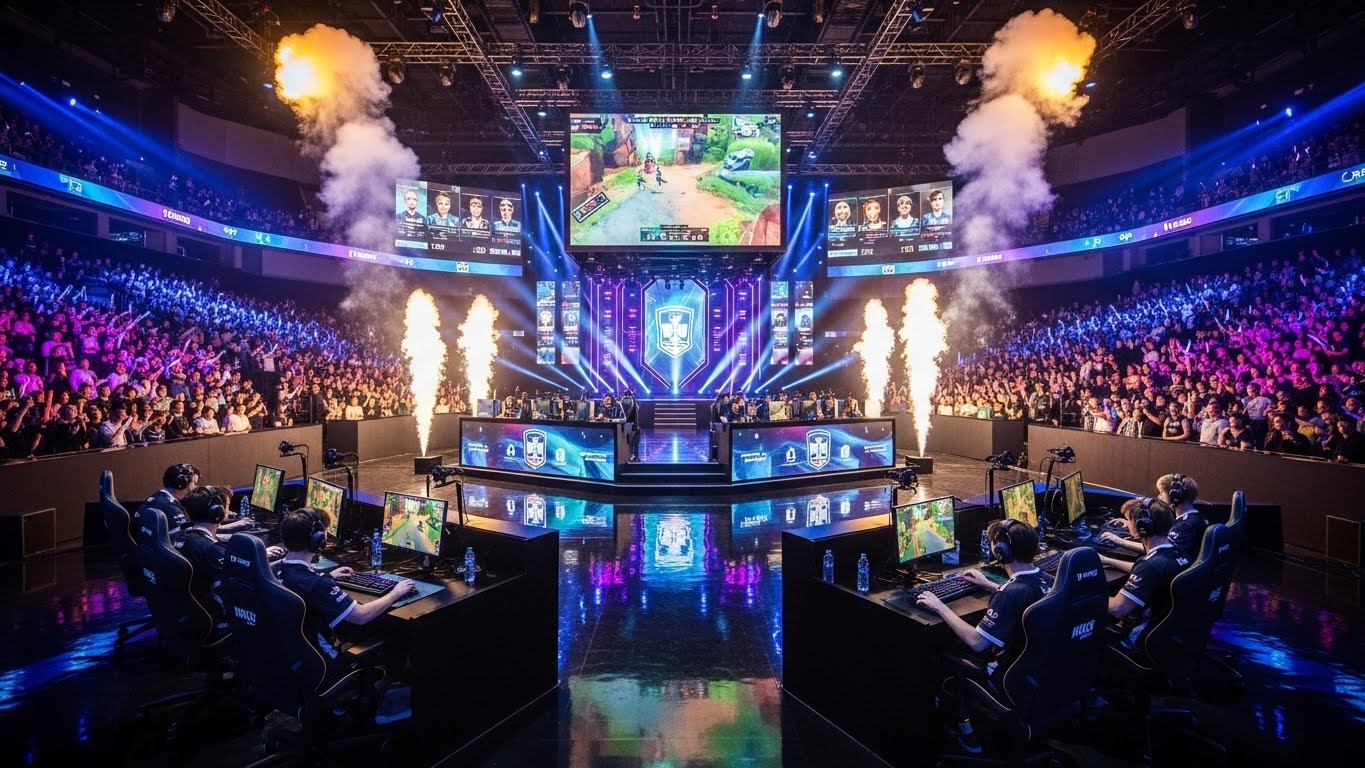Introduction
Esports, or competitive video gaming, has grown from niche communities into a global phenomenon. What began as casual tournaments among friends has evolved into multi-million-dollar events attracting massive audiences, corporate sponsorships, and professional athletes. With technological advancements, increasing accessibility, and cultural recognition, esports now rivals traditional sports in terms of viewership, professionalization, and economic impact.
The rise of esports has not only transformed the way people play and consume games but also reshaped media, entertainment, and even education. Professional players dedicate thousands of hours to practice, analysts study gameplay with scientific precision, and fans immerse themselves in the culture surrounding their favorite teams and games.
This blog delves into the evolution of esports, its cultural and economic impact, the rise of professional leagues, and the future of competitive gaming.
The Origins of Esports
Esports has roots that trace back to the late 1970s and early 1980s, when early arcade competitions became a form of organized gaming. Events like the Space Invaders Championship in 1980 brought together players from across the United States, marking one of the first nationwide gaming competitions. Although modest by today’s standards, these competitions highlighted the potential for gaming as a competitive endeavor.
The 1990s brought technological advancements that helped shape modern esports. With the proliferation of personal computers and the rise of local area networks (LANs), games like Doom, Quake, and StarCraft enabled players to compete against one another in real time. StarCraft, in particular, became a cultural phenomenon in South Korea, establishing the foundation for professional gaming leagues and dedicated esports audiences.
The emergence of online gaming in the late 1990s and early 2000s further expanded esports’ reach. Titles like Counter-Strike and Warcraft III created competitive communities worldwide, paving the way for international tournaments and professional leagues.
The Growth of Professional Esports
Professional esports began to take shape as tournaments and leagues became more structured. By the mid-2000s, international competitions were common, with prize pools attracting top players and teams. South Korea emerged as a hub for esports professionalism, with dedicated training facilities, sponsorships, and televised broadcasts for games like StarCraft.
The development of professional leagues elevated esports into a legitimate career path. Players now sign contracts with teams, receive salaries, and have access to coaching, nutrition, and mental health resources. Professionalization brought a level of rigor and discipline comparable to traditional sports, with training regimens requiring 6–12 hours of daily practice.
Titles like League of Legends, Dota 2, and Overwatch have further expanded the scope of professional esports. Large-scale tournaments such as the League of Legends World Championship and The International for Dota 2 feature prize pools in the millions of dollars, attracting global attention and media coverage.
Esports Games and Genres
Esports encompasses a wide variety of game genres, each with unique mechanics, strategies, and communities. The major categories include:
1. Multiplayer Online Battle Arenas (MOBAs)
Games like League of Legends and Dota 2 define the MOBA genre. Players form teams to battle opponents, controlling unique characters with specialized abilities. MOBAs require teamwork, strategy, and fast reflexes, making them ideal for competitive play.
2. First-Person Shooters (FPS)
FPS games such as Counter-Strike: Global Offensive, Overwatch, and Call of Duty focus on precision, reaction time, and tactical decision-making. These games emphasize individual skill and coordination, attracting large competitive communities and international tournaments.
3. Battle Royale
Titles like Fortnite and PUBG popularized the battle royale genre, where large groups of players compete until a single player or team remains. These games emphasize adaptability, strategic thinking, and survival skills, creating dynamic esports competitions.
4. Sports Simulations
Games like FIFA, NBA 2K, and Madden NFL simulate real-world sports, allowing players to compete virtually with realistic mechanics. Esports leagues for these games mirror professional sports structures, including regular seasons, playoffs, and championships.
5. Fighting Games
Fighting game tournaments, such as those for Street Fighter, Super Smash Bros., and Tekken, highlight skill, timing, and reflexes. Fighting games foster tight-knit communities and have a long-standing tradition in esports history.
Each genre offers unique challenges, audiences, and professional ecosystems, contributing to the diversity and reach of esports worldwide.
The Economic Impact of Esports
Esports has grown into a multi-billion-dollar industry, influencing entertainment, marketing, and technology sectors. Revenue comes from multiple streams, including:
1. Sponsorships and Advertising
Corporate sponsorships represent a significant portion of esports revenue. Companies ranging from energy drinks to technology firms partner with teams and tournaments to reach a highly engaged and younger audience. Branding opportunities include team jerseys, digital advertisements, and event sponsorships.
2. Media Rights and Streaming
Esports broadcasting has exploded in popularity. Platforms like Twitch, YouTube Gaming, and regional streaming services provide live coverage of tournaments to millions of viewers. Major tournaments are now televised on traditional networks, further expanding viewership and revenue opportunities.
3. Ticket Sales and Merchandise
Live esports events attract thousands of attendees to stadiums, arenas, and conventions. Ticket sales and event-specific merchandise, including apparel and collectibles, contribute significantly to team and tournament revenue.
4. Game Publisher Support
Game developers often fund esports ecosystems through prize pools, league management, and promotional initiatives. For example, Dota 2’s The International features an enormous prize pool largely funded through in-game purchases by players, demonstrating the synergy between player engagement and professional competition.
The financial ecosystem of esports continues to expand, drawing investment from venture capital, media conglomerates, and sports organizations, signaling the genre’s long-term sustainability.
Esports Culture and Communities
Esports is more than competition—it is a cultural phenomenon that fosters communities, creativity, and fandom. Players engage with content creators, follow professional teams, and participate in forums and social media discussions. Esports culture emphasizes skill, strategy, and entertainment, creating a sense of belonging among fans.
Online communities play a crucial role in shaping the ecosystem. Forums, Discord servers, and social media platforms allow fans to share gameplay, discuss strategies, and organize amateur tournaments. Community-driven content, including highlights, memes, and tutorials, keeps audiences engaged and expands the cultural footprint of esports.
Cosplay, fan art, and event participation also contribute to esports’ identity. Fans celebrate the characters, teams, and narratives associated with their favorite games, blurring the line between spectator and participant.
Training and Professional Development
The professionalization of esports has led to highly structured training regimens. Elite players practice for several hours daily, focusing on reflexes, strategy, teamwork, and mental endurance. Many professional teams employ coaches, analysts, nutritionists, and psychologists to optimize performance.
Esports academies and training programs have emerged, providing pathways for aspiring players. Institutions in South Korea, China, and North America offer structured education in game mechanics, communication, and sportsmanship, bridging the gap between casual gaming and professional careers.
The dedication required mirrors traditional sports, highlighting the discipline and skill necessary to compete at the highest level.
Esports and Education
Esports is increasingly recognized as an educational and developmental tool. Universities and colleges worldwide now offer esports scholarships, degree programs, and varsity teams. These programs emphasize teamwork, strategy, communication, and problem-solving skills.
Esports also fosters digital literacy, technical skills, and entrepreneurial thinking. Players learn to analyze data, manage teams, and navigate online communities. This integration into formal education helps legitimize esports as a career path and provides opportunities beyond professional gameplay.
Challenges Facing Esports
Despite its growth, esports faces several challenges.
1. Player Burnout
Intensive practice schedules and the pressure to perform can lead to physical and mental exhaustion. Burnout is a significant concern for professional players, highlighting the need for support systems and sustainable training regimens.
2. Regulation and Standardization
Esports lacks universal governance, leading to inconsistencies in tournament rules, player contracts, and age restrictions. Establishing standardized regulations is critical for the industry’s long-term legitimacy.
3. Inclusivity and Diversity
While esports has global reach, inclusivity remains a challenge. Efforts are underway to increase participation among women, minorities, and underrepresented regions, but significant work remains to create equitable opportunities.
4. Technological Barriers
Reliable internet access, powerful hardware, and high-quality streaming capabilities are essential for competitive play. Regions with limited infrastructure may face difficulties in participating fully in global esports ecosystems.
Addressing these challenges will be crucial to sustaining esports growth and ensuring it remains accessible, fair, and enjoyable for all participants.
The Future of Esports
The future of esports looks promising, with continued technological innovation and mainstream acceptance driving growth. Emerging trends include:
1. Virtual Reality and Immersive Experiences
VR esports may redefine competition, allowing players and spectators to engage in fully immersive environments. This will create new forms of gameplay and spectator engagement.
2. Mobile Esports Expansion
Mobile gaming is becoming a dominant platform for esports, especially in regions like Southeast Asia and Latin America. Mobile esports offers accessibility, global reach, and the potential for new competitive formats.
3. Integration with Traditional Sports
Traditional sports organizations are investing in esports teams, bridging audiences and expanding the reach of competitive gaming. Collaborative initiatives may blur the boundaries between digital and physical sports.
4. Enhanced AI and Analytics
Artificial intelligence and analytics are improving player performance and spectator experience. AI can analyze gameplay in real-time, provide coaching insights, and enhance live broadcasts with dynamic statistics.
The combination of innovation, accessibility, and professionalization ensures that esports will remain a major force in entertainment for decades to come.
Conclusion
Esports has evolved from humble beginnings to a global powerhouse, redefining what competitive gaming means. With professional leagues, massive audiences, and technological advancements, esports now rivals traditional sports in prestige and influence.
The genre’s success is rooted in community, skill, and engagement, offering players and spectators unique experiences that combine strategy, teamwork, and entertainment. Esports has created career paths, educational opportunities, and cultural phenomena, demonstrating its profound impact on society.
As technology continues to advance and audiences expand, esports will further solidify its position as a dominant force in digital entertainment. From amateur enthusiasts to professional players and global fans, esports bridges virtual and real worlds, creating a landscape where competition, creativity, and community thrive.
Esports is no longer just a hobby—it is a revolution in competitive entertainment, shaping the future of gaming, culture, and media.



